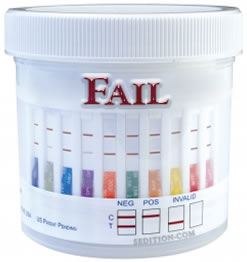“Well, I didn’t really smoke it. My roommate blew it in my face. A bunch of times. Do you think I’ll pass?”
First I tried to figure out why my friend felt the need to have pot smoke blown repeatedly in her face. A fear of holding joints? A mating ritual akin to “Why don’t you give me a little massage”?
Then I had to wonder about the bigger issue: drug testing and all of its nefarious implications.
My friend is a geologist. She doesn’t operate heavy machinery. She doesn’t operate on hearts. She works with rocks and dirt. She writes reports about working with rocks and dirt. Why, then, does she have to pee for perfect strangers?
“I don’t know. I hate it too. I just have to.”
And again, we allow our constitutional rights go right up in smoke.
A few facts about drug testing:
- According the American Management Association, only 8 percent of companies with drug testing programs had performed any cost-benefit analysis.
- The National Academy of Sciences formed the Committee on Drug Use in the Workplace claims, “Illicit drugs contribute little to the overall rate of industrial accidents. This is because most workers who use illicit drugs never use them at work. And when they do so, it is in a way that does not affect their work performance.”
- The most common type of testing specimen is urine, followed closely by hair, saliva and breath testing. Blood testing is seldom used for employment testing, except in cases of accidents or court order.
- Most employers use a standard five-panel test of “street drugs,” consisting of marijuana (THC), cocaine, PCP, opiates (such as codeine and morphine) and amphetamines (including methamphetamine). Most drugs, as well as alcohol, are out of the system within days of use, except for marijuana.
- Urinalysis tests for marijuana, in their current form, are not suitable for detecting drug impairment or recent drug use because the procedure only looks for and detects drug metabolites, not the parent drug THC. Presently, no dose-concentration relationship exists correlating drug metabolite levels to drug impairment.
- Marijuana (or the metabolites created from it) can hang out in your body for quite some time because of its fat solubility. The amount of time ranges from several weeks to as long as 70 days, depending on body weight, frequency, etc. This means that drug testing in the workplace tends to discriminate against pot smokers most readily and easily. And, as mentioned above, pot smokers don’t tend to smoke on the job (unless they work for the arcades, movie theaters or the circus. I used to get stoned before working at this ice cream parlor at a mall. Good fun.)
Not what gets me (and undoubtedly many of the readers here) is that you could be a complete drunk, pose a genuine threat to your workplace, and easily be overlooked by most drug tests. (Heck, it’s only booze, right? The most dangerous “drug” out there.)
But what do expect employers supposed to do? They don’t want to hire a bunch of druggies. Presumably, “potheads” and the like costs them money in missed hours, workplace accidents and, I don’t know, general stoney behavior. But it doesn’t take a scientist to realize that alcohol can be much more a problem in the workplace. Pot smokers don’t tend to suffer from crippling hangovers or the shakes at lunchtime. Pot smokers don’t tend to be full-blown addicts.
Here’s some possible alternatives to discriminatory drug testing, suggested by the Cannabis Consumers Campaign :
Rather than submit a person to drug testing, why not use the traditional method of checking references to find out about an potential employee?
Supervisors need to be trained to identify, confront, or refer impaired employees to Employee Assistance Programs or other intervention programs. Impairment testing not only detects people who are impaired by drugs and alcohol, but also by sleep deprivation, stress, fatigue, emotional problems, over-the counter medications and prescription medications. These tests, once administered, can improve safety far better than drug tests can. They are not discriminatory. Rather, they measure everyone equally by their performance, which is the most significant factor in employment.
That’s crazy talk. Call previous employers? Watch an employee’s behavior? Why, when strangers can examine your bodily fluids and make false judgments about your performance ability?
So to recap:
- Drug testing costs a lot of money and doesn’t prove to be effective.
- Drug testing discriminates against pot smokers.
- Drug testing leaves raging alcoholics, well, raging.
Where’s the cup? Sign me up!
My geologist friend has a good job now. (She passed.) It pays well, she’s insured, she’s doing what she likes, but she sacrificed privacy and her beliefs to get it. I, on the other hand, may never have that kind of career-advancing, well-paid job because I would never submit to a piss test. So a drug test means more than a humiliating piss in a cup; it has far-reaching implications that shape professional paths and money-making ability. And that pisses me off.
[Warning: Below is a photograph of a geologist high on the job. This could be you.]
Sources:
Beth Mann is a popular blogger and writer for Open Salon and Salon. She is also an accomplished artist with over 15 years of experience, as well as the president of Hot Buttered Media. She currently resides at the Jersey shore where she can be found surfing or singing karaoke at a local dive bar.
Contact: maryjane {at } freedomisgreen.com

